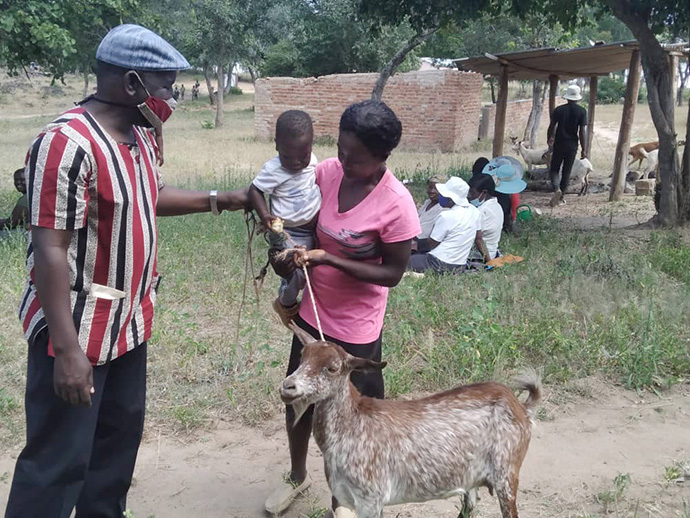
Anoziva Sisimayi and her son Kudzai Gombakomba receive a goat from the Rev. Austern Chepiri in Mujaji, Zimbabwe. A goat breeding program sponsored by the Western Pennsylvania Conference of The United Methodist Church has helped more than 100 orphans and vulnerable children in Zimbabwe. Photo by Pastor Hillary Mukahanana.
Key points:
• Partnership between Western Pennsylvania and Zimbabwe East conferences has empowered more than 100 toddlers through teens, since 2015.
• The ministry also enriches building construction by The Nyadire Connection and other partners, as well as outreach with people living with albinism.
• The Gwese Orphanage Trust responds to the increase in child-headed families who lost both parents to COVID-19; drug and substance abuse by young children who were not in school due to failure to pay fees; and the rise in child marriages.
Children as young as age 3 have a brighter future as they benefit from an empowerment ministry funded by the Western Pennsylvania Conference. Launched in 2015, the goat-breeding program has benefited over 100 orphans and vulnerable children in Zimbabwe’s Mutare District.
Sandra Matoushaya, Western Pennsylvania’s missional engagement coordinator, said her conference has a strong partnership with the Zimbabwe East Conference, which includes the Gwese Orphanage Trust.
Through the Butler District, classroom blocks, teachers’ houses, parsonages and sanctuaries are constructed, while the Johnstown District’s partnership with the Harare East District includes outreach with people living with albinism.
The partnership also includes The Nyadire Connection in Pittsburgh, which has a 15-year partnership with The United Methodist Church’s Nyadire Mission.
“To date,” said Matoushaya,“we have raised over $350,000 for projects in Zimbabwe. This does not include The Nyadire Connection clinic-revitalization program, now completing the sixth (Nyadire Hospital) clinic. Each clinic was rebuilt at a cost of approximately $300,000.”
Kudzai Gombakomba, one of the youngest beneficiaries at age 3, received a doe in April 2021. He lives with his unemployed mother, Anoziva Sisimayi, in Mujaji Village. His father lives in Harare, the capital, some 185 miles away, but seldom visits the family as he is unemployed and cannot afford the bus fare home.
Sisimayi was grateful for the female goat given to her son, as it promises the family a means of livelihood despite the current COVID-19 pandemic and other economic challenges.
“I appreciate the gift of a goat,” she said.“It will improve our livelihood as goats breed fast. I am thankful for this program, which has given hope for a brighter future for our children.”
Praying God’s blessings on the program’s generous benefactors, she promised, “We will try our best to look after these goats so they may breed and benefit others in our community.”
Most beneficiaries of the program are registered under the Gwese Orphanage Trust and are ages 5 to 10. The oldest recipients are 17 years old.
“The children were selected according to their vulnerability and age range,” explained Hillary Mukahanana, Gwese pastor. Recipients include orphans and children being raised by single mothers.
“We also had assistance from local school heads, who highlighted those unable to pay fees, in addition to the disadvantaged family situation,” he said.
Gwese Orphanage Trust has 27 children under its care, and 13 of them did not receive the goats because the trust pays their fees.
“The orphan trust was started in 2001 due to the high number of orphans from the HIV/AIDS pandemic,” said Mukahanana. It was also established in response to the increase in child-headed families who lost both parents to COVID-19; drug and substance abuse by young children who were not in school due to failure to pay fees; and the rise in child marriages. The trust has run several projects, including a tuckshop (school snack bar), a grinding mill and peanut-butter production.
The Rev. Austern Chepiri, Zimbabwe Episcopal Area Board of Trustees secretary and project coordinator, said the “Pass a Goat/Gift to the Next Child” program was meant to empower children and instill ownership and responsibility in caring for the goats.
“We are also teaching them to share and plow back to their communities,” Chepiri said, “by passing on a female goat to a disadvantaged child.”
He noted that five of the 46 goats distributed in April were purchased from previous beneficiaries who sold offspring of their goats to pay school fees.
“The program is expanding to villages around Gwese, such as Chigombwe, Muradzikwa and Mount Dangare,” Chepiri said.
The Gwese program is similar to the United Methodist Committee on Relief’s “We Goat You,” a COVID-19 pandemic relief and livelihood program in the Northwest Philippines Conference.
To ensure food security, last year, 13 households received one young goat each under a doe-sharing agreement. The church will have a stake in the offspring of the goat and share with other willing beneficiaries.
Chikwanah is a communicator in the Zimbabwe East Conference. News media contact: Julie Dwyer at (615) 742-5470 or newsdesk@umnews.org. To read more United Methodist news, subscribe to the free Daily or Weekly Digests.
Like what you're reading? Support the ministry of UM News! Your support ensures the latest denominational news, dynamic stories and informative articles will continue to connect our global community. Make a tax-deductible donation at ResourceUMC.org/GiveUMCom.



